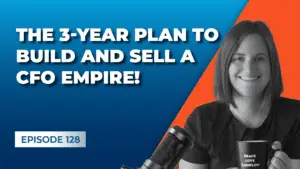What comes to mind when you think of successful companies? Do you picture charismatic leaders, sales figures, or an unbeatable array of products and services? Today, James and Garret discuss a thought-provoking article by Jason Cohen about the one thing successful companies do.
Focusing on one important thing is good for your company and your customers. You’ll find freedom in knowing that your customers don’t expect you to be the best at everything, they just want you to take care of what matters. You’ll also be better able to prioritize what you do, and make wiser decisions about the future of your company.
On this episode you’ll hear:
- A description of the one thing successful companies do
- The dangers of magical thinking
- The importance of timing
- The difference between correlation and causation
If you’re interested in gaining a more critical understanding of what your company does well, then this is one episode you won’t want to miss.
What Makes a Successful Company?
Jason Cohen is a successful entrepreneur based in Boston, Texas, referred to by his company SmartBear, as “Chief Bear”. He has built and sold multiple companies and he regularly writes for the blog on SmartBear.
He is very good at taking complex items from complex industries and narrowing them down to what the key issues are in his articles. This is useful because it can be very hard to figure out what you’re meant to take from complex pieces of information and he summarises it in 200 words or less most of the time, making it digestible for virtually anyone.
In this article, he talks about many successful businesses and he tries to convey what the commonality is between these successful businesses. Jason is arguing that there is one particular thing that the product or service does that customers really want. If you get that one thing right, you will get customers (no matter how bad other aspects of the business are). He indicates that if you can deliver on the key thing the customers want, you can skim through everything else and the customers will still buy it because at the end of the day, it’s what they wanted in the first place. For example, at ProcurementExpress.com we aim to take the hassle out of company purchasing, by offering magical purchasing automation tools. We do all of this on our app that allows users to take charge of their purchasing management using our purchasing software. If someone is looking for purchasing software, they’re going to use us because our app is magical!
The Dangers of Magical Thinking
If you have ever:
- Read anything
- Watched a video
- Listened to someone’s advice
The chances are that you have been fed recycled advice. This is not necessarily the worst thing, as long as it is still valuable advice. However, Jason Cohen’s articles require you to sit down and to try and comprehend what you are reading and what he is expressing. By doing so, readers avoid buying into any magical thinking.
Magical thinking refers to thinking that two things are connected and if you do something, it will lead you towards the same outcome. This outcome distracts people (notably, business owners and managers) from focusing on what decisions are actually proven to lead to a certain outcome. For example, instead of people focusing on the reality of business operations, Garret recalls, “they will look at the spreadsheet that I put up and they will actually just see what the biggest number is and they will try and manipulate that number.” Garrett explains that many times managers will just think they can make everything right with magical thinking and manipulating numbers on a spreadsheet, such as adding a 0 or taking a 0 off of numbers.
The Importance of Timing
Another thing that is mentioned in the article is the importance of timing.
Without the timing being right, your business can collapse. There’s also the fact that timing can make you lucky and unlucky. James points out though that one thing you can do, is you can keep trying… and if you keep trying over and over again, you may just get lucky!
Every time you release a product or a service, there is such a thing as the right time for it and you’ve just got to roll the dice as often as possible to increase your chances of that timing being right. One problem can be that it’s very hard to keep on going with an idea if it keeps on being unsuccessful when executed. It’s not the actual passing of time that increases your chances, it’s the completion of a sincere effort.
The Difference Between Correlation and Causation
Does the thing that you think makes your business successful actually make it successful?
For example, Google gives people free food and drinks on-site, but does that cause success or is it the hard work that makes them successful?
*Hint: It’s the hard work.
There are many businesses who only go through the motions of what it takes to run a successful company and they do not actually focus on what makes them successful. You have to try and figure out what you’re actually learning from everything you are presented with. You can research your competitors, you can research your customers, but if you don’t actually take anything from that then the information is simply useless.
You need to use everything you discover as a learning lesson. Anyone who thinks Google is so successful because they offer employees free beer, probably hasn’t considered that that isn’t the cause of their success, but it’s just a correlation that can be drawn up between their company culture and the success. Perhaps a manager at Google just felt like giving everyone free beers because they felt that the employees deserved them and that it would make them happier… who knows?
What we do know is that Jason Cohen’s article wraps up quite a few remarkable ways of thinking and approaching success and he delivers it in so few words that have allowed us to sit and actually take the time to try and grasp and contemplate what we can do with it.
If you liked this article, make sure to check out some of our other articles whilst you’re at it!




